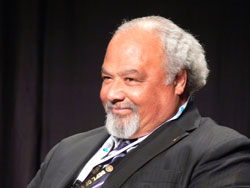The road ahead for PEPFAR: Q and A with Ambassador Eric Goosby
November / December 2013 | Volume 12, Issue 6

Ambassador Eric Goosby, M.D.
Ambassador Eric Goosby, M.D., stepped down from his position as U.S. AIDS Coordinator in late October, 2013, having directed all U.S. government international HIV/AIDS efforts for the past four and a half years. He oversaw the President's Emergency Plan for AIDS Relief (PEPFAR) and its related Medical Education Partnership Initiative (MEPI). He also led U.S. engagement with the Global Fund to Fight AIDS, Tuberculosis and Malaria. Goosby has more than 25 years of experience in HIV/AIDS, from his early years treating patients to his engagement at the highest level of policy leadership.
What are your thoughts as you step down from your position as U.S. Global AIDS Coordinator?
I am deeply grateful to President Obama who gave me this extraordinary chance to serve and to Secretaries Clinton and Kerry for their exceptional leadership in this historic endeavor - and for the faith they put in me. These past four and a half years have been among the most fulfilling of my 30-year career in HIV/AIDS.
I want to express my sincere appreciation to former President Bush, whose bold vision launched PEPFAR and brought the full weight of American power and capability to the global effort to combat this epidemic, and to the United States Congress for its leadership, from both sides of the aisle, which has consistently and courageously stood behind this country's global AIDS efforts.
I also want to send my heartfelt thanks to my staff and to all the incredible men and women with whom I have served - Americans of all backgrounds, as well as colleagues around the world. These committed and courageous people are living proof that through determination, dedication, and unfailing effort all things are truly possible.
And, above all, I want to thank my family, who stood by my side and gave me the strength to carry on not only in recent years, but for the past three decades of my involvement in the fight against HIV/AIDS.
What progress has been made during your tenure?
I am extremely proud of all that we have accomplished together. Since 2008, we have more than tripled the number of individuals receiving lifesaving antiretroviral therapy through support from PEPFAR. We have surpassed one million babies being born without HIV due to PEPFAR-supported programs. And perhaps most importantly, we have arrived at a moment in which creating an AIDS-free generation is truly within our reach.
Through our collective efforts, we have also all been a part of transforming the way that development is done. While continuing to rapidly expand access to lifesaving HIV services, we have moved PEPFAR from an emergency state to a more sustainable footing. We have helped establish a robust health care delivery capability - often where little to none previously existed - that is being used not only to address HIV, but also a broader range of health issues. We have helped elevate issues of health and development into the upper echelons of diplomatic dialogue. And we have evolved our relationship with host countries to a true and enduring partnership - one that positions them to assume greater ownership of their national HIV response.
All of this has only been possible because thousands of committed and compassionate individuals wake up each day and go to bed each night thinking about how we can all do more and do it better. The global AIDS community is truly unlike any other that I have known. I am honored and humbled to have played my small role in this unprecedented worldwide movement.
How do you see the road ahead?
One day in a future we can now clearly see, we will achieve the dream of an AIDS-free generation. When we do, it will mark the completion of an incredible and improbable journey from those terrifying early days of the epidemic in San Francisco.
This epidemic has wrought untold harm on our world, stolen millions of lives, destroyed families and entire communities, and very nearly entire nations. But it also brought out the best in people - in the United States and around the planet.
We can find no better way to honor those we have lost than to keep pushing forward, and to complete the task that we began more than thirty years ago. We must also ensure the lessons of this fight are truly learned and applied to many of the other challenges our world faces. In this way, we can build a future that is not only healthier, but also more peaceful, more just, and more secure for generations to come.
This feature is adapted from Continuing Our March to an AIDS-Free Generation and Improved Global Health, the Ambassador's final post to the State Department DipNote blog on November 1, 2013.
More Information
To view Adobe PDF files,
download current, free accessible plug-ins from Adobe's website.